Since the launch of The Original Series in the 1960s, Star Trek has always prided itself on its celebration of diversity. Through the philosophy of “infinite diversity through infinite combinations,” the shows and movies have continued to promote equality among real and fictional races, genders, and cultures. The new Paramount+ original series have continued this legacy, adding characters from the LGBTQIA+ and disabled communities.
The United Federation of Planets is presented as a beacon of hope for a contemporary society that still struggles with division and prejudice. There has been one major exception to this in Star Trek’s future history, and it is something that has become a focus for the new Paramount+ shows, especially Star Trek: Prodigy and Star Trek: Strange New Worlds.
Augment prejudice
Dal’s origins have been a big mystery and issue for the character since the series debuted in 2021. Previewing the final 10 episodes of the season, Dal voice actor Brett Gray told TrekMovie in October:
I’m most excited for people to see Dal’s origin story. I think it tackles one of the last prejudices, even of Starfleet. And I think it’s going to be a big moment in the Trek Universe for momentous change.
Now know have a good idea of what Gray was hinting at—in the latest episode, “Masquerade,” Dal learned he was genetically engineered; specifically, he’s a “human Augment blended with the most recessive traits of 26 species.”
Using genetic engineering to create augmented humans was first introduced in the classic episode “Space Seed” of Star Trek: The Original Series. The USS Enterprise encountered the Botany Bay, a ship full “superhumans” who were exiled from Earth in the 1990s following the Eugenics Wars. Their leader, Khan Noonien Singh, is still considered Star Trek’s greatest villain, especially after his return in the 1982 film Star Trek II: The Wrath of Khan. The rise of Khan and other supermen led to United Earth banning genetic engineering, a ban later adopted by the United Federation of Planets.
The Trek franchise has remained consistent with this ban on genetic engineering throughout the decades. More of the Augment backstory was explored in 2004 with an arc on Star Trek: Enterprise featuring Brent Spiner as geneticist Dr. Arik Soong, who was imprisoned for using embryos left over from the Eugenics Wars to create and raise a group of Augment children, leading to the “Augment Crisis” of the 22nd century which almost started a war with the Klingons. Dal was directly linked to this (and therefore to Khan and the Eugenics Wars) in Prodigy when Dr. Jago said he was the “handiwork of the protégés of Dr. Arik Soong.”
Baby steps
When “Space Seed” aired in 1967, the specter of eugenics was still fresh in the public’s mind, only a generation after the end of World War II and the rise of race-based fascism that led to genocidal policies. The story of Khan and his “supermen” was a cautionary tale against history repeating itself. At the time, the concept of gene splicing was still decades away, with molecular biologists James Watson and Francis Crick having just been awarded a Nobel Prize in 1962 for discovering the molecular structure of DNA.
Star Trek: The Next Generation began a new era for the franchise in 1987, and both the science and ethics of genetics had evolved, including the launching of the Human Genome Project in 1990, which completed its work of mapping all human DNA in 2003. The project also included a special committee to “plan for the ethical, legal, and social implications” that might result from the work.
Yet even in a more enlightened 24th century, a century after “Space Seed,” genetic engineering was only allowed in the Federation for the correction of genetic medical conditions. Any genetic enhancements or augmentation was against the law and any person benefiting from such work was banned from serving in Starfleet. This issue was explored on Star Trek: Deep Space Nine when it was revealed that Dr. Julian Bashir was genetically enhanced. Julian’s father confessed to having him altered at a young age and was sent to prison, but Dr. Bashir was allowed to remain in Starfleet, with the warning that “for every Julian Bashir that can be created, there’s a Khan Singh waiting in the wings.” The series later introduced a group of genetically enhanced humans who had to be institutionalized after suffering a variety of different disabilities.
A new view
Star Trek’s view of genetic augmentation as dangerous is somewhat inconsistent with how it treats pushing the frontiers of other technologies. A prime example of this is artificial intelligence. Trek has plenty of stories dealing with the dangers of AI and robots, a staple of science fiction, yet there was never a stated ban on the science behind AI (except for a period after “Synths” were framed for a terrorist attack in the late 24th century). Star Trek: The Next Generation famously featured Commander Data (Brent Spiner again), an android and a senior bridge officer who became one of the most celebrated and beloved characters of the franchise. Data’s rights as an android were explored in multiple episodes, and the theme of sentient technology was later picked up on Star Trek: Voyager with the Holographic Doctor as a main character. The entire first season of Star Trek: Picard revolved around Data’s “daughter” and Synths being vindicated and accepted by the Federation.
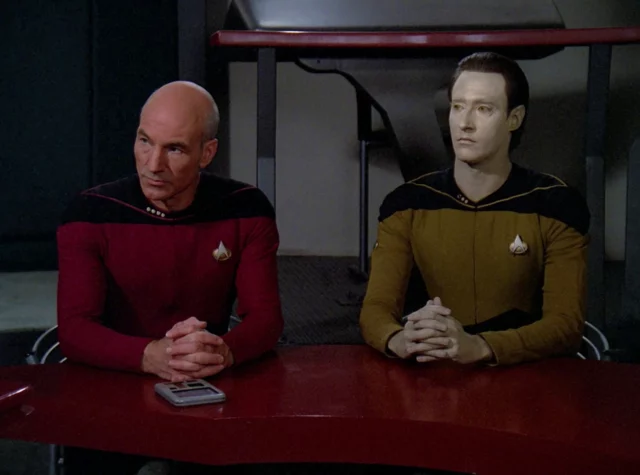
Captain Picard (Patrick Stewart) argues for the rights of Commander Data (Brent Spiner) “Measure of a Man”
Now the new Star Trek shows are revisiting the topic of genetic engineering in both live-action and animation. Much like the treatment of artificial intelligence in the ’90s Trek shows, Augments aren’t being seen as something to fear, but as people we should sympathize with and understand.
The first season of Star Trek: Strange New Worlds first tied into the history of genetic engineering with the main character of La’an Noonian-Sing, a descendent of Khan’s who is not genetically enhanced, who feels shame over her family’s past. This created conflict when it was later revealed her close friend Una Chin-Riley, the first officer of the USS Enterprise, was an Illyrian, a humanoid race that practiced genetic engineering, a fact she’d kept hidden from Starfleet. While La’an took some time to accept it, Captain Pike was clear he would not expose her, saying, “I don’t care where you come from. You’re the best first officer in the fleet.”
In that same episode, “The Ghosts of Illyria,” the Enterprise discovered a colony of Illyrians who had doomed themselves after trying to remove their genetic modifications in hopes of joining the Federation. Strange New Worlds shone a light on the rigidity of the Federation’s policy, showing it can cause harm as it did for those ill-fated Illyrians. The debate will be explored further in the upcoming second season as it addresses the season 1 cliffhanger where Una was arrested for being genetically enhanced. Hopefully, the show finds a way to allow her to remain in Starfleet even if she might only be an exception to the policy; after all, the series is still set in the 23rd century.
And now, Star Trek: Prodigy is also challenging the genetic engineering conventions with the big reveal about Dal. When Dal was hurt to find out he didn’t have any actual parents, his friends rallied around him, assuring him there was “no one else like you.” The episode also explored the cautionary side of genetic “cheating” when Dal asked Dr. Jago to enhance his dormant genes, with comical and dangerous results.
This still leaves the issue of Dal being the result of genetic engineering. Just passing through a Starfleet scanner in episode 11 set off alarms to notify Starfleet immediately. This is going to be a big issue for Dal, who has led the USS Protostar crew through the first season with the main goal of getting to the Federation and eventually joining Starfleet Academy. Based on franchise history and known 24th century Federation law, there’s no way for Dal to attend Starfleet Academy or join Starfleet—but surely there must be something that can be done.
Given Brett Gray’s comment about genetic engineering being one of the “the last prejudices” in Star Trek and how this is “going to be a big moment in the Trek Universe for momentous change,” it looks like the franchise is ready to start treating genetic engineering the same way it views artificial intelligence. Sure, there are dangers, but there are also opportunities. And wasn’t it Captain Picard himself who said (in TNG’s “Justice”): “There can be no justice so long as laws are absolute. Life itself is an exercise in exceptions.”?
Another clue may come from the executive producer and co-creator Dan Hageman, who said in his midseason interview with TrekMovie, “I want these characters to become young adults and someday adult crew members.” He also said, “We want to make sure that kids today can dream about the day that we can get our stuff together.” So it doesn’t sound like they are going to crush Dal’s dream of joining Starfleet Academy, though it might be a hard road to get there. It can’t be an accident that Dal’s complicated genetic makeup includes all four founding members of the Federation (Humans, Vulcans, Tellarites, and Andorians). How can the Federation say no to that?
What do you say?
Is it time for Star Trek (and the Federation) to loosen up when it comes to genetic engineering and Augments? Will Number One be allowed to return to her post on the Enterprise? Will Dal be accepted into Starfleet Academy? And will the Federation and Starfleet go beyond making exceptions and expand their diversity to simply accept the genetically augmented? Let us know in the comments below.
Keep up with news about the Star Trek Universe at TrekMovie.com.

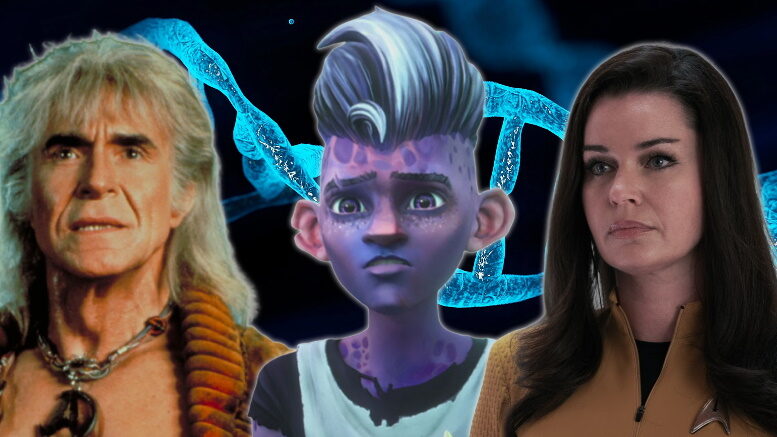


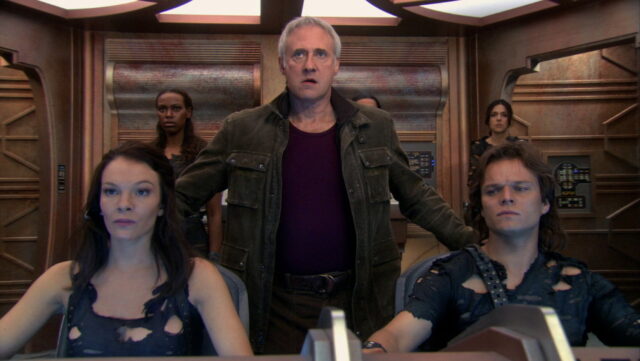
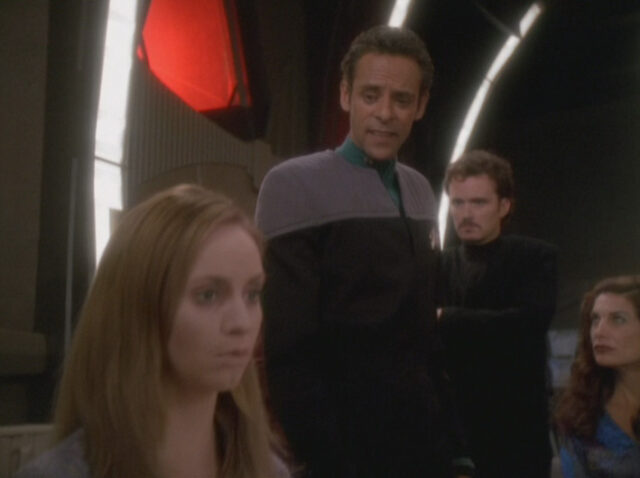
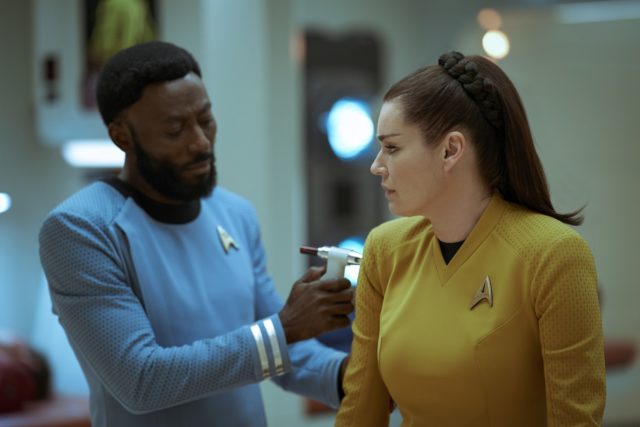
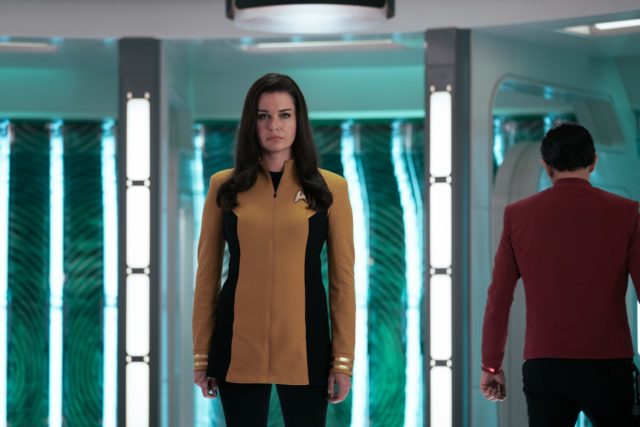
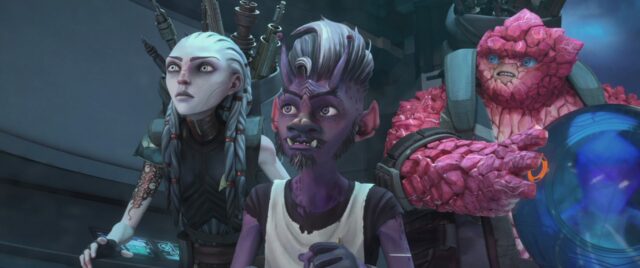





What is missing here is the ramifications. If you accept eugenics in the Federation then everyone will have to genetically modify themselves to keep up. Already Starfleet should be a bunch of holographic android life that can do everything, to keep up all organics will have to super engineer themselves. This of course is great sci-fi / cyber punk stuff but some how I doubt we’d see a shades of grey discussion / sophistication to understand why the ban, what happens when it is removed, etc.
A very good point. Just because one thing is bad doesn’t mean you tear all the way over to the other side. And just because something is legal doesn’t mean it’s good. Limit it to correcting actual genetic disorders? But then how do you define those? How smart should Bashir *have* been, or how smart can you make him? I don’t know.
Sorry but I’m not in agreement since we as a race will perfect nanotechnology into our medical systems and eventually everyone will have them in their bodies and the nanotechnology will keep us from aging as well as getting sick from any kind of disease or illness. Human kind will evolve into living not just hundreds of years but tens of thousands of years. We will eventually spread out across the universe and populate it with trillions of our kind
I doubt humanity will make it out of the 21st century but I guess I could be wrong.
have faith.
Your not in agreement there is no grey area because you’d fully embrace the engineering of “perfect humans” in a eugenics program and there is no ethical or moral qualms about it?
Uh… sorry, but I maintain my worry (potentially even more so then before) that new Trek dumbs it all down where we all end up on the front lines in the Eugenics Wars. It’s ironic because I think I’d have your argument were it not FOR TOS (in TOS all the cultures that seek perfection and ignore all consequences ended up destroying themselves or setting up a killer robot, etc). New Trek leaves some wondering why we don’t just turn on the magic mushrooms for space travel and that is not a good thing.
Thanks for an interesting article! Although I think it’s important for Star Trek to talk about prejudice, I’m not sure that doing it through Augments is the best choice. There are real issues around genetic engineering that don’t easily map to real-world prejudice on the basis of race or gender or sexual orientation.
TOS cleverly used prejudice against Spock to talk about prejudice, thus enabling the show to give us a future where humanity is no longer prejudiced against subsets of itself while still enabling the show to teach us about how wrong prejudice is. I think this can be updated without getting into the question of genetic engineering.
I like Una Chin-Riley and hope we get to keep her. But if she’s ousted from Starfleet, it would explain why she doesn’t become captain of the Enterprise when Pike is promoted to fleet captain and Kirk is given the ship instead.
I dunno, I think Augments are kinda the perfect way to discuss it. They had a huge uprising during the Eugenics wars because of Khan and his followers and then Earth banned genetic engineering. I mean at the time it happened it was out of fear and thats what humans do when they are afraid of something that is new and they can’t quite grasp it or understand it.
And what better analogy for that then the literal human representation for life created out of technology you have just created but can’t quite define the abilities or ambition of? It’s really the same with Spock. He’s SO different. Stronger. Faster. Smarter. So hard to understand because he seemingly has none of the emotions that drive humans even though he looks just like us. He might as well be an augment if you think about it. Even though he wasn’t genetically manipulated.
Sorry, hon. I’m too sick today to talk about Star Trek … and you know that means I’m SICK. :-)
Yeah, there is no way the Eugenics wars was caused because Kahn and his followers thought they was superior (and in physical and intelligence were superior) to everyone and thus deserved to rule over humanity… killed millions and then came the Eugenics ban…. sigh.
Instead it was just mean people banning it and Kahn was just a poor dude trying to escape the heat. Uh, Into Darkness was just.. the worst.
I don’t know about the last point: There are a lot of ships in the fleet, and we only see a very small slice of it in Star Trek. It’s more than likely that Number One got some other command, maybe even before Pike was promoted off the Enterprise.
Or, you know, she put on a blonde wig and became a nurse. :-)
but somethings just don’t go away.
the ST universe is still riven with prejudices of some kind or other.
of course the shows are about transcending those faults but its an endless battle that has to be fought even in the far future.
the issue of GE tech is the perfect ST subject to really talk about current issues
Hmm. Doesn’t the Federation have 2 Prejudices? I mean genetically engineered biological life and AI (at least till they start to merge together like the PIcard type Androids) are kinda separate classes of beings, aren’t they?
In between Measure of a Man and Children of Mars, Androids essentially had the same rights as organics. The Federation has always been pretty prejudiced against holograms though.
Well I’m not sure it’s that cut and dry. In measure of a man it was deemed Data had the right to choose and couldn’t be forced into what was essentially Starfleet servitude. I’m not sure you could say that he had the same rights as organics. And remember there was still stigma against him as officers didn’t want to serve under his command purely because he was an android. And even after data’s right to choose was defined, that admiral still chose to try and forcibly take Lal away from him.
Well, admirals are always trying corrupt bullshit. I’m not sure that his decision would have held up in court. And the dude who didn’t want to serve under his command just seemed like an all-around prejudiced dude. He was also against Klingon counselors, as if the entire species was incapable of providing mental health services. There will always be individuals who are prejudiced, but Federation society as a whole seems to have mostly moved past that.
why does being promoted to admiral turn you into a semi corrupt a hole?
LOL it didn’t always, it’s just a thing that TNG tended to do. Badmirals and all that. But if you lok through the cracks TNG did have its fair share of decent admirals.
Well we got them in TUC and DS9 as well. We didn’t get any on Enterprise or Voyager thankfully. Did recently get one in Lower Decks.
I’ve sometimes wondered if the Federation had an earlier ban on AI development, or at least strongly discouraged it. This might explain why Noonien Soong did his experiments in faraway colonies and why we saw so few robots and drones and so forth in earlier Treks (it was due to budgetary reasons, of course, but I’m just wondering about an in-universe explanation).
This also makes me wonder if AI was used extensively in WW3, hence the trepidation surrounding it. Picard sure seemed awfully upset about Data creating Lal, at first, and the admiral was even more worried about it.
Anyway, please forgive my rambling theories. Thank you for the article. A good read.
I also think that TOS believed in a Dr. Penrose type approach that organic life could not be completely replicated by any electric Turing machine (robot/android). For example V’ger has all the knowledge in the universe but cannot imagine and seeks “the creator” to do so. Thus may tried to make artificial life and/or upload themselves but failed (and with the M5 took out a couple starships in the process).
The Illyrians are likely to get an “opt-out” of the common Federation policy on genetic engineering, much as some individual EU member states have an opt-out from adoption of the euro, Schengen, and so on.
Phlox also said that the Denobulans, unlike Earth, had successfully practiced genetic engineering for centuries. He was quite open about it, too, even if he personally had not undergone the process. If Denobula indeed joined the Federation, it must have obtained an opt-out during Archer’s time.
It may also be that enough species have engaged in genetic engineering, without Khan-like outcomes, that the human taboo against it begins to look untenable 200 years after the formation of the Federation. Perhaps by the time of Prodigy the other Federation members impose a kind of Meiji Restoration-like openness to genetic engineering on Earth (and Earth-influenced Federation political bodies). You can definitely see how the issue would expose political cleavages between various Federation member worlds.
Excellent piece.
Just a historical note: The eugenics craze didn’t begin in Nazi Germany but in the Progressive Era of the US. Indeed, the Nazis sent people to the US in the 1930’s to examine and adapt it for themselves. The founders of Planned Parenthood, for example, were eugenicists whose main goal was to have less “undesirables” (which mostly meant recent European immigrants); state governments actually had forced sterilization of the “feeble minded” (which often meant perfectly normal poor whites), which was infamously upheld by the Supreme Court under none other than Oliver Wendell Holmes. It was all part of the “enlightened,” “science above all” attitude of the era, was championed by all the greatest, famous people, and should serve as a warning lesson to us all.
Ah yes, I see what you did. Nazis aren’t bad, Planned Parenthood is. Nice one.
Give me a break. Nazis murdered my great-grandparents. They’re a heck of a lot worse than Planned Parenthood.
What a Manichean age we live in.
Personally I think it an issue that can be tackled but not judged one way or the other. Just put it out there for discussion. This is a very complex idea. Trek was at its best when there was no good answer to something and spawned thinking about it.
But… This is Secret Hideout.
Yes. I think they should tackle it but like DS9 in acknowledging the grey area. I mean that is entertaining and fun as a bonus.
Star Trek is at its core about the human condition, and the improvement of humanity. Once you start “improving” yourself through artificial means, you’ve ceased your natural development. Another theme of Star Trek is that there’s always a cost for artificial/superhuman ability — Gary Mitchell, Apollo, Dr. Corby, Khan, Sargon, Rayna, the Companion, et. al. The Talosians destroyed themselves through superior mental ability, and the Providers became sadistic. You could have perfect robot officers beam down in a landing party, instead of a human Captain, but then where’s your drama? Why go to space at all? Just reengineer yourself.
Wow this is so funny but the irony about your statement, at least according to one futurist academic, humans would literally have to genetically alter themselves if we ever want to travel to or colonize other planets. I watched this video a few years ago and when I saw your post I thought of it again. It’s a TED Talk, but if you’re curious on his thoughts I cued the section where he really gets into it:
https://youtu.be/w8lH8tNlAXc?t=493
Again, it’s just his ‘opinion’ but it’s clearly a very educated one. And it’s more proof that if we ever get beyond our solar system space travel will probably look absolutely nothing like we see on Star Trek. And the chances are if we do make it to another solar system some day it will probably either be be A.I. robots or yes ‘improved’ humans just to make the trip and can survive on a planet longer than a few months and create sustainable life there. But hopefully do it without having the urge to subject humanity as their slaves like all those freaks. ;)
I LOVE READING THROUGH THE COMMENTS ON THIS TOPIC!! It’s as if I’m reading a script outline being developed for a GREAT Star Trek episode or movie! Hey, all you producers of the new ‘Trek series (all of them): LISTEN here and find all the answers to the pertinent and important questions you will need to craft a TERRIFIC episode! Listen – REALLY LISTEN — to the concerns and ideas being presented here, and then write away!
I noticed “Unnatural Selection” was not noted in the article. While the results were disastrous, Federation scientists were conducting genetic engineering experiments in that episode, apparently condoned by the Federation.
There’s a difference to breed and raise children to become ambitious Nietzschean Super People. Then to give them genetic gifts including, let’s say, and an increase in compassion rather than ambition, combined with an ethical and loving upbringing. I’ve always been 99% nurture and 1% nature. Better this be done responsibly and openly than in hiding with no standards. Also, Starfleet only takes the best of the best, Same for the Vulcan Science Academy and Vulcan Expeditionary services. How many good and hard working individuals are left out because they lost out on the genetic lottery. That’s already practicing a form of Eugenics: Accepting only the very best, with everyone else being second best, including crewmen (non-Starfleet commissioned officers.) Maybe the Romulans did this to themselves to get rid of Vulcan telepathy as well as the Plak Tow (blood burning) otherwise known as the Vulcan 7 year itch that males undergo has to be resolved in the Pon Far Mating Ceremony? Starfleet got rid of diseases. But in Dr. Bashir’s case, not his terrible learning disability. And he’s probably among the most moral members of all the Star Trek characters. Why was Dr. Miranda Jones (TOS) played by Diana Muldaur, the only human telepath. Did Starfleet geneticists get rid of all the human psychic gifts?
I think there are two fronts on this:
There are species in the Star Trek world build that did use genetic augmentation ethically, and the only species that we know that did unethically. To properly change someone genetically, it needs to be done as early as possible, ideally, in the fetal stage, which also means, like Dal and Rebecca, did not choose to be augmented. It’s reasonable as the first step to allow augmented people that did not choose to be augmented and continue to disallow the practice of creating augmented people without the slippery slope to allowing eugenics. So it would criminalize only the offenders, not the victims of the usage of prohibited technologies.Notice that augmenting people is very different than genetic treatment, genetic treatment affects the cells type that needs fixing, and that change would be maintained through the meiosis process (cellular replication) and almost always doesn’t affect the organs that produce reproductive cells, which means that the changes in genetic treatment are not hereditary.